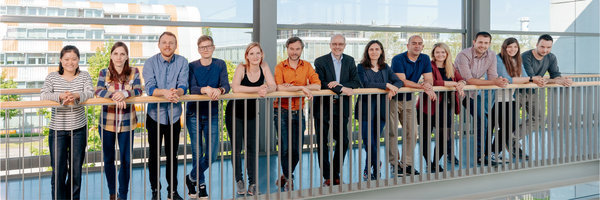
Research of the Sundmacher Group
Energy modules, growth, enzymatic cascades for synthetic living systems.
The specific responsibilities of the PSE group within the MaxSynBio consortium include:
- Compartmentalization and growth (tools for production, functionalization, characterization, and controlled increase of compartment size)
- Establishment and characterization of energy and cofactor regeneration modules for artificial cells (light- or chemically-driven)
- Establishment and characterization of metabolic (e.g. for CO2fixation) and transport modules
- Coupling of the energy supply modules with different energy sink subsystems
- General methodology for integration of functional parts and modules and modular design of synthetic cells, based on assembly standards and mathematical modeling

Compartmentalization is a major landmark of living systems, which serves to establish gradients or spatially segregate various processes from the environment and from each other. Thus, the reconstitution of living processes is inherently associated with the creation and manipulation of compartments. Within this technology platform, we are developing various methods for production and characterization of nano- and microcompartments of different chemical compositions, including conventional and microfluidic tools. In addition, we establish different protocols for membrane functionalization and study of the respective interactions. We mainly rely on phospholipid membranes and natural biochemical machinery but in parallel, we try to expand the chemical dimensions to allow for more efficient or entirely novel functions. We use these functionalized compartments as parts and modules to mimic certain natural processes and describe them via mathematical models, which provides possibilities for optimization and a quantitative framework for integration.
Active processes in living systems need continuous supply of energy and materials and the energy supply and storage are closely connected to the cellular metabolism. One of critical steps in sustaining of life-mimicking processes in synthetic cells is energy i.e. ATP regeneration. Examples of such energy demanding processes in the MaxSynBio consortium are metabolism (L2), cell division (L4) and motility (L5). Previous studies have shown that simple ATP addition or ATP regeneration systems which do not regenerate ATP directly from ADP and Pi have no or only limited successes due to the accumulation of ATP hydrolysis products. Therefore, we develop energy supply modules, which can convert chemical or light energy into ATP, termed “Solar-to-ATP” and “Chemical-to-ATP”, based on different proton pumps and ATP synthase. In parallel we develop strategies for the redox management of NAD cofactors, which are involved in metabolic transformations.
The reconstitution of metabolism involves the establishment of cofactor- and energy-dependent enzymatic cascades in microcompartments as rudimentary mimics of living cells. In parallel we devise transport schemes for the influx and efflux of matter. A significant part of the research activities is devoted to the optimization and energy management (in terms of ATP/NADH regeneration) of the CETCH cycle, as a prime example of a synthetic pathway for the production of multi-carbon compounds from CO2. We rely on close integration of experimental and modeling work for understanding and optimization of this cascade and therefore collaborate closely with the Erb Group.
